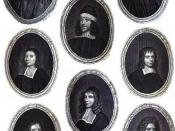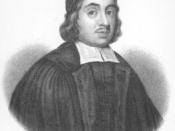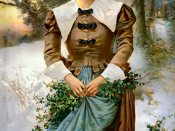As far as opinions go, those held by historians about the Puritans are among the most spread apart and controversial that can be found. Three groups of historians have each formed quite different points of view about the way of life of the Puritans. Of these three groups: the Filiopietists, Progressives, and Harvard historians, one was very pro-Puritan, another, very anti-Puritan, and the third falls somewhere in the middle. It is by examining all of these different points of view that we may get the most accurate and least biased account of the way of life of the Colonial Puritan people.
[Filiopietists]
The Puritan people were a hard working people. They dedicated their lives not only to religion, but also to helping their communities survive and grow. They did everything within their power to ensure that their people not only lived successful lives, but happy ones as well. Among the many accomplishments the Puritans made to the betterment of society was the founding of the first schools and universities in the Americas.
Through education, they attempted to establish a positive and morally inseparable way of life.
The Filiopietists agreed with and respected the amazing amount of hard work the Puritans displayed each day, and the strict ethical code by which their society chose to live by. They believed very strongly in the idea that many traditions of the new world sprang from the beliefs of the Puritan people. Virtues such as thrift, hard work, and moral honesty were the results of the impact of the Puritans on the people of the new world. The Filiopietists sometimes referred to the Puritans as the torchbearers of religious liberty and political freedom. It would be hard to imagine a more respectable compliment than that. One of the more commonly studied Filiopietists was...



Good Essay
Well organized, well-defended and well-argued. Honestly showing all sides of the issue.
1 out of 1 people found this comment useful.